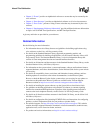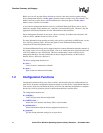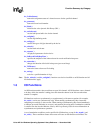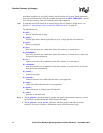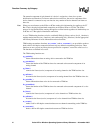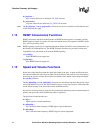
18 Voice API for Windows Operating Systems Library Reference — November 2003
Function Summary by Category
termination conditions are specified just before the I/O function call is made. Obtain termination
reasons for I/O functions by calling the extended attribute function ATDX_TERMMSK( ). See the
Voice API Programming Guide for information about I/O terminations.
Note: To send and receive FSK data from an Analog Display Services Interface (ADSI) device, see
Section 1.6, “Analog Display Services Interface (ADSI) Functions”, on page 20.
The I/O functions are:
dx_dial( )
dials an ASCIIZ string of digits
dx_getdig( )
collects digits from a channel digit buffer (for up to 31 digits plus the null terminator)
dx_pause( )
pauses on-going play
dx_play( )
plays voice data from any combination of data files, memory, or custom devices
dx_playiottdata( )
plays voice data from any combination of data files, memory, or custom devices, and lets the
user specify format information
dx_rec( )
records voice data to any combination of data files, memory, or custom devices
dx_reciottdata( )
records voice data to any combination of data files, memory, or custom devices, and lets the
user specify format information
dx_resume( )
resumes paused play
dx_setdevuio( )
installs and retrieves user-defined I/O functions in your application
dx_setuio( )
installs user-defined I/O functions in your application
dx_stopch( )
forces termination of currently active I/O functions
dx_wink( )
generates an outbound wink
Notes: 1. The dx_playtone( ) function, which is grouped with global tone generation functions, can also
be classified as an I/O function and all I/O characteristics apply.
2. The dx_playvox( ) and dx_recvox( ) functions, which are grouped with I/O convenience
functions, can also be classified as I/O functions and all I/O characteristics apply.







